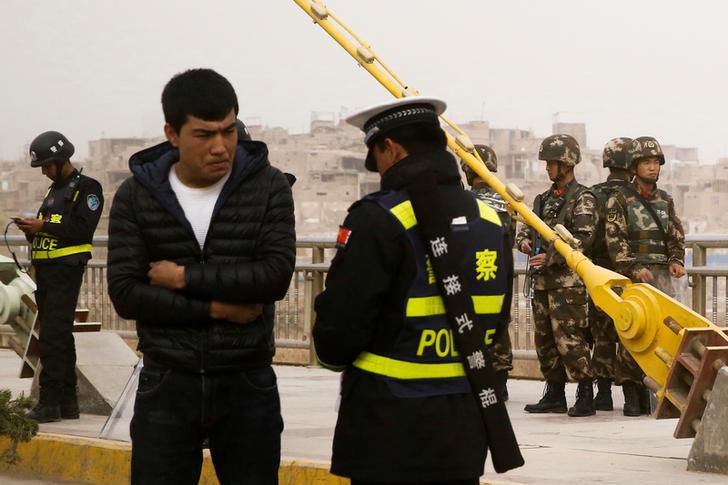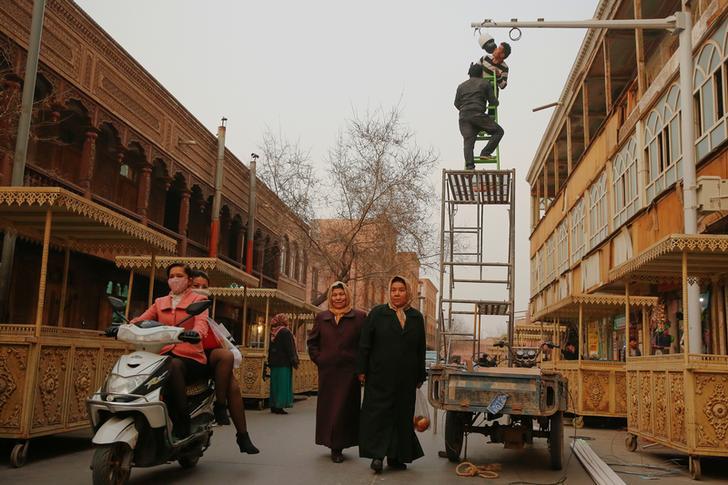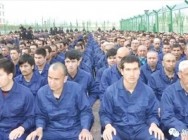A police officer checks the identity card of a man as security forces keep watch on a street in Kashgar, Xinjiang Uighur Autonomous Region, China, March 24, 2017.
© 2017 Reuters/Thomas Peter
(New York) – China’s police are collecting DNA from individuals for a nationally searchable database without oversight, transparency, or privacy protections, Human Rights Watch said today. Evidence suggests that the regional government in Xinjiang, an ethnic minority region with a history of government repression, intends to accelerate the collection and indexing of DNA.
In many parts of the country, police officers are compelling ordinary individuals – neither convicted nor even suspected of a crime – to have their blood drawn and DNA taken. Samples have also been collected from vulnerable groups already targeted for increased government surveillance, including migrant workers, dissidents, and minority Muslim Uyghurs. Because police wield wide powers, and because there are no actionable privacy rights in China, people have little ability to refuse the collection of such personal information.
“DNA collection can have legitimate policing uses in investigating specific criminal cases, but only in a context in which people have meaningful privacy protections,” said Sophie Richardson, China director at Human Rights Watch. “Until that’s the case in China, the mass collection of DNA and the expansion of databases needs to stop.”
In the early 2000s, the Chinese Ministry of Public Security started building a searchable, national DNA database called the “Forensic Science DNA Database System” (法庭科学DNA数据库系统), also known as “National Public Security Agencies DNA Database Application System” (全国公安机关DNA数据库应用系统), as part of a larger police information project known as the Golden Shield.
By late 2015, the Ministry of Public Security had accumulated 44 million “miscellaneous data entries.” The government claims it is the biggest in the world. It includes data from more than 40 million individuals, while 1.5 million entries refer to physical evidence related to crime scenes. The Ministry of Public Security runs a second, separate “Combat Trafficking DNA Database” ( “打拐” DNA数据库) with more than 513,000 DNA entries. Authorities have stated that the DNA databases are used for solving crimes, including terrorism and child trafficking, as well as to identify bodies and vagrants.
Documented cases demonstrate that the collection of DNA does not appear to be connected to solving specific cases of crimes. Police have conducted campaigns to amass biometrics from ordinary citizens simply because it has identified gathering “basic information” (基础信息) a goal, important for the unspecified need to “solve crimes.” In these notices, local police stations hail the success of their drives, publicizing the dozens or hundreds of DNA samples they collected.
In addition, Chinese law appears to limit police collection of DNA samples to people connected to the investigation of a specific criminal case. Article 130 of the Criminal Procedure Law states that in the course of criminal investigations, in order to “ascertain certain features, conditions of injuries, or physical conditions of a victim or a criminal suspect, a physical examination may be conducted, and fingerprints, blood, urine and other biological samples may be collected. If a criminal suspect refuses to be examined, the investigators, when they deem it necessary, may conduct a compulsory examination.” But there are no legal guidelines on how long DNA samples can be stored, shared, or used, or how their collection can be challenged.
“Mass DNA collection by the powerful Chinese police absent effective privacy protections or an independent judicial system is a perfect storm for abuses,” Richardson said. “China is moving its Orwellian system to the genetic level.”
Background: Popular Objections to DNA Collection
Individuals who have had their DNA taken by police have detailed their experiences on social media platforms, including Weibo, Zhihu, Baidu Zhidao, Tieba, and Tianya. In these posts, netizens described officers coming to their homes, schools, and workplaces to collect their samples; none described having been presented any warrant or the visits having been announced in advance. In other cases, people discuss having been required to provide DNA samples when they applied for documents from the police, including residency permits and ID cards. In some other cases, police officers have demanded DNA samples from individuals whom they had taken to the police station for questioning, though in the vast majority of these cases the individuals were not suspects formally detained or arrested for crimes.
Some people said online that they “did not want to have their DNA taken” or were “very upset” about having their information taken. In one post on Tianya dated June 28, 2016, a person who was forced by police officers in Zhongshan, Guangdong province, to supply his DNA sample following a routine roadside ID check wondered: “Why was I treated like this? I am not a criminal, but this is worse than a criminal, I’ve been feeling very upset. I’m afraid what they’d do to my sample.”
These posts reflect peoples’ unease about why their information was collected, whether the collection was legal, would the collection have a negative impact on their lives, and if a criminal record or investigation would follow. There was also anger over a lack of informed consent.
In a post on Tieba dated August 6, 2016, a netizen whose DNA was taken as part of the ID application process wrote, “I went to the county police station to get them to re-issue my ID, and they took my blood and DNA sample…why did they take my DNA? [They said] that’s the rule. If you don’t let us do it we won’t issue [your ID] …now even f***** DNA belongs to the Chinese Communist Party!”
The issue of DNA collection has received some press attention. In one case in Shandong province, police collected DNA from more than 5,000 male students in one college in October 2013. The students were given no explanation about why their information was taken, and many “did not understand nor felt comfortable about it.” When reached by journalists, the school said it was to cooperate with the police’s request to establish a database about migrant populations, but the police said it was to solve a number of theft cases on the campus.
Profiling in DNA Collection
Police notices published in recent years describing these drives typically include broad categories of target populations beyond “suspects and criminals.” These categories vary, but typically include: “focus personnel,” a broad term referring to anyone authorities perceive as potential threats, such as dissidents, activists, petitioners, and anyone with a prior criminal record; “work targets,” another vague term police use to describe persons of interest such as those with administrative infractions to criminal convictions; and migrants (流动人口), meaning anyone whose hukou (or “residency permit”) is not located in the area, including migrants from the countryside. There are also drives targeting particular establishments – hostels, entertainment venues, internet cafes, and rental homes – in which DNA is collected from anyone police deem “suspicious.” A few notices targeted particular professions: sex workers and locksmiths.
This form of broad and discriminatory social profiling appears to be a form of preventive policing. Some of these local police drives targeting migrant workers state as their objective “stability maintenance” – a government euphemism for silencing criticism and staving off protests. Examples include:
- In Shaanxi province, officers from police stations in Baoji City, Shangluo City, and Tongchuan City visited local companies between October and November 2016 to collect the DNA of migrant workers, claiming a need to “ensure stability”;
- A police station in Guiyang City, Guizhou province, waged a campaign to collect information from migrants, including DNA samples and fingerprints, as part of an effort to “construct harmonic society”;
- A police station located in a border town in Jilin province collected 247 samples of DNA from migrants in the area in July 2015. This “improved migrant population information,” helped solve crimes, and “strengthened the level of social safety and security.”
Some peaceful government critics and activists also report that their DNA was collected, typically during interrogations or questioning in police stations:
- Shen Liangqing, a Hefei activist, had his biometrics taken by the police, including blood samples, twice in 2015, after he was interrogated for accepting an interview of a foreign press and tweeting about the Tianjin chemical explosions of 2015. The police said they needed to “gather citizens’ information” but gave no further explanation about what it might be used for, or how it would be stored, according to Shen.
- Police forcibly took the DNA, photo, fingerprints, and palm prints of a Jiangxi anti-corruption activist Liu Ping during an 11-hour interrogation session in September 2012, during which she was tortured, and told her the information was needed for constructing a “criminal database.” Liu is currently serving six years in prison.
- Guangdong authorities took the DNA and fingerprints of activist He Yanyun after interrogating him about an article on human rights lawyers he wrote in July 2015.
- Officers taking human rights lawyer Wang Quanping into custody in April 2014, after he attempted to attend the trial of a fellow rights lawyer, told him they had to collect fingerprints, blood, and DNA samples from him. The officers told Wang that this was a regular procedure for everyone brought to the station, in order to “gather citizens’ information.” After Wang protested, saying he was not suspected of any crime or detained under criminal procedures, the officers did not take his biometrics but subsequently upgraded his case from an administrative case to a criminal case, detaining him for eight days.
Alarming Trends in Xinjiang
Human Rights Watch reported in November 2016 that police have required all passport applicants in Xinjiang – not suspects or convicts in a criminal case – to supply DNA samples as part of their application. Xinjiang, home to approximately 10 million Muslim Uyghurs, has a long history of state repression.
Further investigation by Human Rights Watch found that in September 2016, the Xinjiang regional police bureau issued two calls for tender – at 60 million RMB (US$8.69 million) and 20 million RMB (US$2.90 million) – for a total of 12 DNA sequencers, 30 polymerase chain reaction (PCR) amplifiers, and 1000 batches of genotyping kits. The purchase indicates that the Xinjiang Public Security Bureau (PSB) intends to build large-scale infrastructure to profile a large number of individuals, according to four DNA experts Human Rights Watch spoke to. However, because the full tender document is not publicly accessible, it is difficult to assess precisely the scope of this infrastructure.
In 2016, the Xinjiang PSB also issued a “Notice to Fully Carry Out the Construction of Three-Dimensional Portraits, Voiceprint and DNA Fingerprint Biometrics Collection System” (关于全面开展三维人像、声纹、DNA指纹生物信息采集系统建设相关工作的通知). But the full document is not publicly available. It is unclear who is targeted for such collection; how this information is to be used, shared, or stored; the rationale behind the collecting; or how one challenges the collection. A separate call for tender issued by the Yopurga County Police Bureau, Kashgar, Xinjiang, cited the “notice” and stated that the biometric collection is part of “stability maintenance.” Regional authorities have revealed little about these new efforts.
Lack of Safeguards
A DNA database allows police not only to search for an exact match, but also a search for those who are related family members. If police have access to a DNA sample from a cousin, nephew, or aunt in the database, they can know that the person they are looking for is a first or second-degree relative and focus their search on the family in question. Ministry of Public Security (MPS) researchers who work on the DNA database say that more complex familial DNA searches are not currently effective given the way the police DNA database is structured. But some provincial authorities, particularly in Henan Province, are attempting to gather additional data, including “Y-STR” DNA information, or Y-chromosome information passed down along the male descendants of families, to systematically map out family trees.
While there are MPS internal departmental rules that focus on the administrative or technical aspects of DNA data collection, most are not publicly available. The “Rules on the Construction of the Forensic Science DNA Database System” (法庭科学DNA数据库建设规范GA/T418—2003), published in 2003 by the MPS Forensic Center, states that the database consists of data from those who have “violated the law and committed crimes,” but it does not further describe or delineate this set. A 2009 MPS document outlines “ten types of cases” and “eight types of individuals” that can be targets for such collection, but Human Rights Watch was unable to find the document online and there is no public information giving further details. A notice issued by the Shanghai Public Security Bureau gives more details: those who have committed “violent, drug-related, sex-related crimes” as well as “anyone who has been subjected to above administrative and public order punishments” should have their DNA taken. The latter group would include individuals who were not convicted of crimes, but merely subjected to administrative detention, a form of deprivation of liberty imposed by the police alone without court decision. In early 2017, the Chinese government issued new draft amendments to its Public Security Administrative Punishments Law, in which a new provision, article 112, was added authorizing police to collect biometrics, including through blood samples, for the purpose of determining victims and perpetrators in minor administrative cases.
DNA databases are not inherently illegal and have been justified at times as permissible investigative tools. But to meet international privacy standards enshrined in the International Covenant on Civil and Political Rights, which China has signed but not ratified, a DNA collection and retention mechanism must be comprehensively regulated, narrow in scope, and proportionate to meeting a legitimate security goal.
The United Nations Special Rapporteur on the right to privacy has noted that DNA databases can raise human rights concerns, including “potential misuse for government surveillance, including identification of relatives and non-paternity, and the risk of miscarriages of justice.” Collection of DNA without the subject’s full informed consent can only be justified in very limited circumstances, such as when necessary to the investigation of a serious crime, and must be prescribed by law for reasons that comport with human rights.
DNA gathering systems like the one China operates have been ruled violative of privacy rights elsewhere. For example, in 2008 the Grand Chamber of the European Court of Human Rights (ECHR) outlawed the collection and indefinite retention of fingerprints, cell samples, and DNA profiles. The European Court, in reaching its conclusion, reasoned that sweeping, indiscriminate DNA databases violated the right to personal privacy. It added that DNA collection may be appropriate in relation to state security and crime prevention, but only if the collection system is heavily regulated by established law and open to the careful scrutiny of a judiciary. Similarly, the United States Supreme Court, in Maryland v. King, ruled that the collection and retention of DNA profiles on people convicted of violent crimes were legal given the limited types of collection, analysis, and use of samples provided by statute.





















